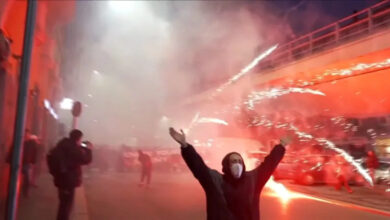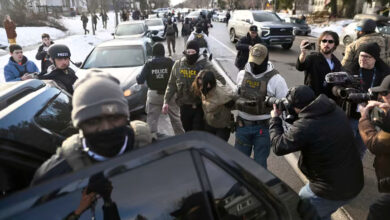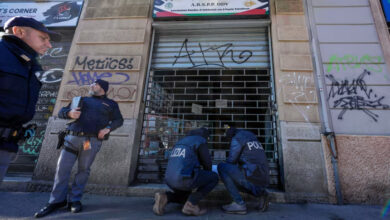Rome and Milan–Italy's Coptic community organized demonstrations in various parts of the country to express support for Coptic Christians in Egypt after the New Year’s Eve bomb attack on a church in Alexandria.
There are between 20-25,000 Copts in Italy, one of the largest Coptic communities in Europe. France counts about 250,000 Copts, and Great Britain 20,000.
Milan, the northern Italian city, saw a sit-in on 3 January in front of the Egyptian embassy in Porpora Street, with some demonstrators blocking the road for a few hours. Tensions increased when Muslim citizens arrived, and police intervention was required.
On 9 January, about 200 people gathered in Milan’s Duomo Square in a demonstration organized by Mario Borghezio, a European Parliament member known for his anti-Islam and xenophobic ideas. Members of the political party Io amo l’Italia (I love Italy), founded by Magdi Allam, an Egyptian-born Italian journalist who converted from Islam to Roman Catholicism in 2008, took part.
Neither demonstration received the support of the Coptic diocese of Milan, which consists of about 12,000 Copts led by Bishop Anba Kirollos.
Salama Fahmy, a worshipper who is particularly active in the church and close to Kirollos, told Al-Masry Al-Youm: “The Bishop did not approve the sit-in from a spiritual point of view since he disagrees with the idea of priests leaving the church to demonstrate in the streets. There are two main reasons. First, the church is not a political entity; second, the way to support the Copts in Egypt is through prayer and sending aid to the affected families. This is why Coptic churches of the diocese of Milan held a mass prayer on 8 January for the dead and the wounded of the Alexandria attack.”
According to Fahmy, the diocese agreed to meet Egypt’s ambassador to Italy and the consul general in Milan at the monastery of Anba Shenouda in Lachiarella to express condolences and discuss the current situation of the Copts in Egypt. They stressed the urgency of education reform, the spread of the concept of citizenship regardless of religious affiliation, changing the rules for church construction, upholding the rights of non-Muslim families, and other measures aimed at eliminating inequality between Copts and Muslims.
According to a Coptic Egyptian resident in Milan for 33 years, who preferred to remain anonymous, the Coptic church there asked them not to provide comments so as not to make the situation worse and endanger the lives of the Copts in Egypt.
Fear pervaded in the Milan demonstration. All those interviewed were reluctant to give their names, afraid of endangering relatives in Egypt. They denounced the Egyptian government’s "conspiracy of silence," which, they said, has failed to end discrimination against Copts, though it is stipulated in the Constitution. Interviewees cited the need to obtain a presidential decree to build a church, the low number of Copts in parliament, and the fact that key positions remain inaccessible to Copts.
Many of the Egyptians who joined the sit-in told Al-Masry Al-Youm that they had emigrated because religious discrimination prevented them either from finding jobs or advancing their careers.
An Egyptian man, who preferred to remain anonymous, said, “They rarely release documents to Copts, and they prohibit people from converting to Christianity by putting them in jail.”
Rome was also ripe with Coptic reactions to the incident. The Coptic diocese of Rome has some 7000 worshippers, and is led by Bishop Barnaba al-Soryani. Unlike Milan, the Rome dioscese organized the 9 January demonstration in support of Coptic Egyptians and against terrorism and religious discrimination.
Criticism started before the event, when al-Soryani asked Muslims and Jews not to take part in the Repubblica Square sit-in, saying it was the wish of Copts to mourn within their community. He invited them to organize a different demonstration.
About 1000 Copts from different areas, including Turin, Florence, and Reggio Emilia, gathered amid massive security measures. Prayers in Arabic and Italian were recited by Bishop al-Soryani and priests from all over the diocese, with the participation of Antonio Paris, the regional councilor for Lazio.
“Save the Christians,” “We are Egyptian Christians, human beings: We are not animals, we want protection and equality and freedom,” and “The blood of our brothers asks for justice,” were some of the slogans raised by the Italian-Egyptians, who included a significant number of families with children and women.
Noteworthy were the continual reminders by the Egyptian organizers not to speak about mosques or politics to journalists.
Shoukry, a Copt who works as a pizza chef, said he emigrated to Italy because he could not find a job due to discrimination. “My wife cannot go to a Coptic gynecologist because Coptic gynecologists cannot practice,” he added, giving examples of daily discrimination faced by Copts in Egypt. “Equality does not exist in the field of work or the streets. If a woman walks around wearing a cross, she is harassed. We are persecuted in any possible way.”
“The government pretends to know nothing,” said another Egyptian with Italian citizenship who asked to remain anonymous. “You cannot park a car outside any church, so I wonder how the car that exploded could have been there.”
“We are strangers in our own country,” said Alessandro, a young Egyptian man.
According to Bishop al-Soryani, “All Christians have sought to express their grief in this demonstration for the terroristic attack in Alexandria and the one occurred last year in Naga Hammadi. We want to say ‘enough with the blood.’ This is not good for our Egypt. Our New Years’ Eve was stained with blood.”
“From the Egyptian government we only expect justice, and jail sentences for those guilty of the Naga Hammadi massacre,” he added. In January 2010, eight Copts were shot dead in the Upper Egyptian city of Naga Hammadi.
Antonio Paris called on Europe to take a clear position against the increasing hatred faced by Christians in Egypt and other countries in the Middle East. “The problem is now very serious. Governments should stop caring only about oil and business, and help the Christians tangibly,” he said.
A prayer in St. Peter’s Basilica preceded the Rome demonstration, so Catholics could show solidarity with the global Christian community. Gianni Alemanno, the mayor of Rome, attended along with various deputies and members of parliament.
Common requests to the Egyptian government by Copts in both Milan and Rome include eliminating the field of religion in identity cards, changing regulations on the construction and restoration of churches, changing the school curriculum to include the pre-Islamic period, which is currently omitted, and other reforms aiming at eliminating religious discrimination.
Additional reporting by Valentina Cucca in Milan.




